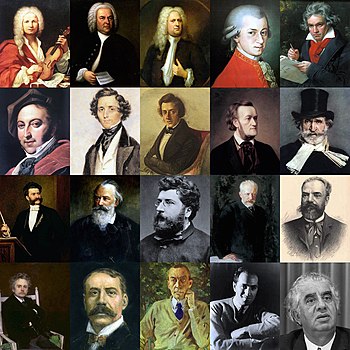Styles
On this radio station you will find the following music styles;
Classical Music
Our focus is mainly on the Christian Classical Music.
The Article Classical Music on wikipedia however gives a good overview;
Top row: Antonio Vivaldi, Johann Sebastian Bach, George Frideric Handel, Wolfgang Amadeus Mozart, Ludwig van Beethoven;
second row: Gioachino Rossini, Felix Mendelssohn, Frédéric Chopin, Richard Wagner, Giuseppe Verdi;
third row: Johann Strauss II, Johannes Brahms, Georges Bizet, Pyotr Ilyich Tchaikovsky, Antonín Dvořák;
bottom row: Edvard Grieg, Edward Elgar, Sergei Rachmaninoff, George Gershwin, Aram Khachaturian
Classical music is art music produced or rooted in the traditions of Western music, including both liturgical (religious) and secular music. While a similar term is also used to refer to the period from 1750 to 1820 (the Classical period), this article is about the broad span of time from roughly the 11th century to the present day, which includes the Classical period and various other periods.[1] The central norms of this tradition became codified between 1550 and 1900, which is known as the common practice period. The major time divisions of classical music are as follows: the early music period, which includes the Medieval (500–1400) and the Renaissance (1400–1600) eras; the Common practice period, which includes the Baroque (1600–1750), Classical (1750–1820), and Romantic eras (1804–1910); and the 20th century (1901–2000) which includes the modern (1890–1930) that overlaps from the late 19th-century, the high modern (mid 20th-century), and contemporary or postmodern (1975–2015) eras.[citation needed]








